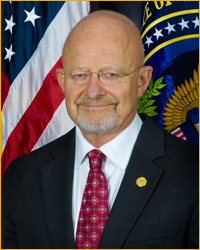SOLD-OUT: The Director of National Intelligence on “Global Threats to U.S. National Security”
June 3rd, 2016
The World Affairs Council is pleased to present a discussion with the Honorable James R. Clapper, the Director of National Intelligence. Director Clapper serves as the head of the U.S. intelligence community, which includes the Central Intelligence Agency, Defense Intelligence Agency, and National Security Agency. He is the principal advisor to the president on intelligence matters related to U.S. national security and is charged with integrating foreign, military, and domestic intelligence to defend U.S. security and U.S. interests abroad.
Director Clapper will offer insights on the many and varied threats to U.S. national security—from terrorism to cyber to regional instability—and how the United States is responding to protect American lives and interests around the world.
This event is part of the 2015-2016 Community Programs Policy & Thought Leaders Series.
 The Honorable James R. Clapper was sworn in as the fourth Director of National Intelligence (DNI) on August 9, 2010. As DNI, Mr. Clapper leads the United States Intelligence Community and serves as the principal intelligence advisor to the President.
The Honorable James R. Clapper was sworn in as the fourth Director of National Intelligence (DNI) on August 9, 2010. As DNI, Mr. Clapper leads the United States Intelligence Community and serves as the principal intelligence advisor to the President.
Mr. Clapper retired in 1995 after a distinguished career in the U.S. Armed Forces. His career began as a rifleman in the U.S. Marine Corps Reserve and culminated as a lieutenant general in the U.S. Air Force and Director of the Defense Intelligence Agency. His intelligence-related positions over his 32 years in uniform included Assistant Chief of Staff for Intelligence at U.S. Air Force Headquarters during Operations Desert Shield/Desert Storm and Director of Intelligence for three war-fighting commands: U.S. Forces Korea, Pacific Command, and Strategic Air Command. Of note, he also served two combat tours during the Southeast Asia conflict and flew 73 combat support missions in EC-47s over Laos and Cambodia.
Directly following his retirement, Mr. Clapper worked in industry for six years as an executive in three successive companies with his business focus being the Intelligence Community. Mr. Clapper also served as a consultant and advisor to Congress and to the Departments of Defense and Energy and as a member of a wide variety of government panels, boards, commissions, and advisory groups. He was a member of the Downing Assessment Task Force that investigated the Khobar Towers bombing in 1996, and was vice chairman of a commission chaired by former Governor Jim Gilmore of Virginia on the subject of homeland security.
Mr. Clapper returned to the government in September 2001 as the first civilian director of the National Imagery and Mapping Agency (NIMA). He served as Director for five years transforming it into the National Geospatial-Intelligence Agency (NGA) as it is today.
Prior to becoming the Director of National Intelligence, Mr. Clapper served for over three years in two Administrations as the Under Secretary of Defense for Intelligence, where he served as the principal staff assistant and advisor to the Secretary and Deputy Secretary of Defense on intelligence, counterintelligence, and security matters for the Department. In this capacity, he was also dual-hatted as the Director of Defense Intelligence for DNI.
Mr. Clapper earned a bachelor’s degree in government and politics from the University of Maryland, a master’s degree in political science from St. Mary’s University, San Antonio, Texas, and an honorary doctorate in strategic intelligence from the then Joint Military Intelligence College.
His awards include three National Intelligence Distinguished Service Medals, two Defense Distinguished Service Medals, the Air Force Distinguished Service Medal, the Coast Guard’s Distinguished Public Service Award, the Department of Defense Distinguished Civilian Service Award, and a host of other U.S. military and foreign government awards and decorations. He was named as one of the Top 100 Information Technology Executives by Federal Computer Week in 2001, and has been singled out by the NAACP in the form of its National Distinguished Service Award, and has been awarded the Presidentially-conferred National Security Medal.